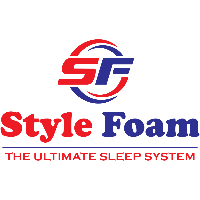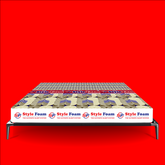Introduction
A good night’s sleep is essential for physical and mental well-being. For individuals suffering from chronic pain, mobility issues, or recovering from surgery, sleep quality becomes even more critical. That’s where medicated mattresses come into play. Designed specifically to offer therapeutic support, medicated mattresses have grown in popularity across homes, hospitals, and elder care facilities.
But what exactly is a medicated mattress? How is it different from a regular mattress? And how do you choose the right one for your needs?
This comprehensive guide answers all those questions and more, giving you an in-depth understanding of medicated mattresses—types, benefits, and buying tips.
What Is a Medicated Mattress?
A medicated mattress is a specially designed mattress that provides therapeutic benefits for individuals dealing with specific health conditions such as chronic back pain, arthritis, pressure ulcers, joint issues, or mobility impairments. Unlike standard mattresses that primarily focus on comfort, medicated mattresses are engineered to:
-
Improve spinal alignment
-
Reduce pressure points
-
Enhance circulation
-
Minimize motion transfer
-
Support post-operative recovery
These mattresses are often used in hospitals, rehabilitation centers, and elder care homes, but they are increasingly making their way into residential bedrooms as awareness of sleep health grows.
Who Should Use a Medicated Mattress?
While anyone can benefit from enhanced support and alignment, medicated mattresses are especially recommended for:
-
Seniors and elderly individuals
-
Patients recovering from surgery or injury
-
People with arthritis or joint disorders
-
Individuals with chronic back or neck pain
-
Bedridden patients prone to pressure ulcers (bedsores)
-
Pregnant women needing lumbar support
They’re also a great choice for anyone who wants to prevent musculoskeletal issues through better posture during sleep.
Key Benefits of a Medicated Mattress
1. Pain Relief
One of the most significant benefits of a medicated mattress is pain management. Whether you suffer from lower back pain, joint stiffness, or post-surgical discomfort, the targeted support of a medicated mattress can help reduce pain and inflammation.
2. Better Spinal Alignment
Unlike conventional mattresses, medicated mattresses help maintain the natural curvature of the spine. This can alleviate the pressure on discs and nerves, reducing the likelihood of pain upon waking.
3. Pressure Point Reduction
For people who are confined to bed for long periods, pressure sores can be a serious concern. Medicated mattresses often include pressure-relieving technologies such as memory foam or air cells to evenly distribute body weight and relieve pressure points.
4. Improved Circulation
By alleviating pressure on various parts of the body, these mattresses promote better blood flow, which is essential for healing, especially after surgery or injury.
5. Durability and Hygiene
Medicated mattresses are typically constructed with high-quality, antimicrobial materials that resist bacteria, mold, and dust mites—making them more hygienic and longer-lasting than regular mattresses.
6. Motion Isolation
For couples, these mattresses minimize motion transfer, meaning one person's movements won’t disturb the other, contributing to a deeper, more restful sleep.
Types of Medicated Mattresses
There’s no one-size-fits-all when it comes to medicated mattresses. Depending on the specific medical condition and the level of support needed, different types offer unique benefits.
1. Memory Foam Medicated Mattress
These mattresses conform to the shape of the body, offering tailored support and exceptional pressure relief. They’re ideal for:
-
Chronic pain sufferers
-
Arthritis patients
-
Elderly individuals
2. Orthopedic Mattress
Designed specifically to support joints, bones, and the overall musculoskeletal system, orthopedic mattresses are commonly recommended by doctors and physiotherapists.
Best for:
-
Back pain
-
Joint issues
-
Postural correction
3. Latex Medicated Mattress
Latex offers natural breathability, hypoallergenic properties, and excellent spinal support. It’s more responsive than memory foam and has a bouncy feel.
Best for:
-
People with allergies
-
Hot sleepers
-
Eco-conscious buyers
4. Air Pressure Mattress (Alternating Pressure Mattress)
These are advanced therapeutic mattresses mainly used in hospital settings. They use a system of air chambers that inflate and deflate to alleviate prolonged pressure.
Best for:
-
Bedridden patients
-
Pressure ulcer prevention
-
Long-term care
5. Hybrid Medicated Mattress
Combining memory foam, latex, and innerspring coils, these mattresses offer the best of all worlds—support, comfort, and airflow.
Best for:
-
Combination sleepers
-
Couples
-
People with multiple sleep issues
How to Choose the Right Medicated Mattress
Choosing a medicated mattress can be overwhelming, especially with so many options available. Here’s a simple checklist to help guide your decision.
✅ 1. Consult a Healthcare Provider
Always start by consulting your doctor, physiotherapist, or chiropractor. They can help identify the underlying issue and recommend the type of mattress that would provide the most benefit.
✅ 2. Identify the Primary Health Concern
Is it lower back pain, arthritis, pressure ulcers, or general discomfort? Different mattresses are designed to target different problems.
✅ 3. Check the Firmness Level
Medicated mattresses typically range from medium-firm to firm. A firmer surface helps maintain proper spinal alignment, but too firm may not relieve pressure points. Medium-firm is often ideal for most people.
✅ 4. Material Matters
-
Memory foam: Great for contouring and pressure relief.
-
Latex: Best for support and breathability.
-
Air/gel layers: Offer dynamic pressure management.
✅ 5. Temperature Regulation
Look for breathable materials or cooling gel layers if you tend to sleep hot.
✅ 6. Hygiene & Allergies
Choose a mattress with hypoallergenic and antimicrobial properties to prevent skin irritations and respiratory issues.
✅ 7. Trial Period and Warranty
A good mattress company will offer a sleep trial (usually 30–100 days) and a long-term warranty. This gives you peace of mind in case the mattress doesn’t suit your needs.
Care and Maintenance Tips
To maximize the lifespan and effectiveness of your medicated mattress:
-
Rotate regularly to avoid uneven wear
-
Use a waterproof and breathable mattress protector
-
Clean with a vacuum and spot-clean stains with mild soap
-
Keep the mattress on a flat, supportive bed base
-
Allow ventilation by airing it out every few weeks
Medicated Mattress vs. Regular Mattress: Key Differences
| Feature | Medicated Mattress | Regular Mattress |
|---|---|---|
| Support Level | Tailored therapeutic support | General comfort |
| Material | Memory foam, latex, air cells | Foam, innerspring |
| Target Audience | People with medical needs | General public |
| Price | Higher, due to specialized design | Varies widely |
| Durability | Often more durable and hygienic | Depends on brand |
| Health Benefits | Pain relief, posture correction, healing | Basic comfort |
Top Brands Offering Medicated Mattresses
If you’re ready to invest in one, here are a few reputable brands known for their high-quality medicated mattresses:
-
Tempur-Pedic – Premium memory foam with pressure relief
-
Sleep Number – Customizable air support
-
Sealy Posturepedic – Excellent orthopedic options
-
Emma or Simba (UK) – Known for hybrid and supportive foam models
-
Drive Medical – Air pressure systems for hospital-grade care
Conclusion
A medicated mattress can be life-changing for those struggling with pain, mobility issues, or poor sleep quality. With targeted support, pressure relief, and superior construction, it goes beyond traditional mattresses to offer true therapeutic benefits.
Whether you’re recovering from surgery, dealing with chronic back pain, or simply want to improve your sleep posture, investing in a medicated mattress can significantly enhance your quality of life.












